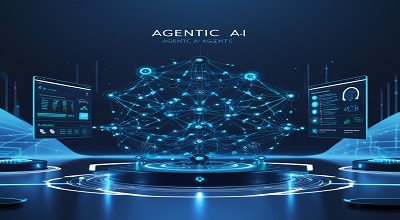Agentic AI
Agentic AI, or autonomous AI agents, represents the next evolution in artificial intelligence, where systems can independently make decisions, learn, and execute tasks without constant human oversight. Unlike traditional AI, which follows predefined rules, Agentic AI operates with a level of autonomy that mimics human-like reasoning and adaptability.
What is Agentic AI?
Agentic AI’s refers to intelligent systems capable of setting goals, making decisions, and taking actions in dynamic environments. These agents can analyze data, learn from experiences, and improve over time—much like a human would.
How Does It Differ from Traditional AI?
While conventional AI relies on rule-based programming (e.g., chatbots with scripted responses), Agentic AI uses advanced machine learning, reinforcement learning, and natural language processing to operate independently.
Why Is Agentic AI Gaining Traction Now?
Recent advancements in computing power, big data, and neural networks have made autonomous AI agents more viable than ever. Businesses and researchers are investing heavily in Agentic AI for its potential to revolutionize industries.
The Core Technologies Behind Agentic AI’s
Agentic AI relies on a combination of cutting-edge technologies that enable autonomy, adaptability, and real-time decision-making.
Machine Learning & Deep Learning
These technologies allow AI agents to recognize patterns, predict outcomes, and refine their decision-making processes without explicit programming.
Reinforcement Learning & Self-Improvement
By using trial-and-error methods, AI agents optimize their strategies, much like how humans learn from experience.
Natural Language Processing (NLP) for Communication
NLP enables AI agents to understand and respond to human language, making interactions seamless.
Computer Vision for Environmental Interaction
Autonomous AI agents use computer vision to interpret visual data, enabling applications like self-driving cars and robotic automation.
Blockchain & Decentralized AI Networks
Blockchain ensures transparency and security in AI decision-making, particularly in finance and healthcare.
Key Applications of Autonomous AI Agents
From healthcare to finance, autonomous AI agents are revolutionizing industries by performing complex tasks with minimal human intervention.
Healthcare: AI Doctors & Diagnostic Assistants
AI agents analyze medical records, predict diseases, and even assist in surgeries with precision.
Finance: Autonomous Trading & Fraud Detection
Banks use AI agents to detect fraudulent transactions in real-time and execute high-frequency trades.
Customer Service: AI-Powered Chatbots & Virtual Assistants
Advanced chatbots handle customer queries, resolve complaints, and even upsell products autonomously.
Manufacturing: Smart Robots & Predictive Maintenance
AI-driven robots optimize production lines and predict equipment failures before they occur.
Autonomous Vehicles & Drones
Self-driving cars and delivery drones rely on Agentic AI to navigate and make real-time decisions.
Latest Advancements in Agentic AI’s (2024-2025)
Recent breakthroughs in Agentic AI are pushing the boundaries of what autonomous systems can achieve.
Multi-Agent Collaboration (AI Teams Working Together)
AI agents now collaborate, sharing data and strategies to solve complex problems.
Self-Learning AI with Limited Supervision
New models require minimal human input, learning directly from unstructured data.
AI Agents with Emotional Intelligence
Some AI systems now recognize human emotions, improving interactions in customer service and therapy.
Real-World Deployment: Success Stories & Case Studies
Companies like Tesla, Google, and IBM are already deploying autonomous AI agents with measurable success.
Ethical & Security Challenges of Agentic AI
While Agentic AI’s offers immense potential, it also raises critical ethical and security concerns.
Bias & Fairness in Autonomous Decision-Making
AI can inherit biases from training data, leading to unfair decisions in hiring or lending.
Privacy Concerns & Data Security Risks
Autonomous AI requires vast data, raising concerns about misuse and breaches.
Accountability: Who Is Responsible for AI’s Actions?
If an AI agent makes a harmful decision, who is liable—the developer, user, or the AI itself?
Regulatory Frameworks & Global AI Policies
Governments are scrambling to create laws that ensure ethical AI use without stifling innovation.
The Future of Agentic AI’s: Predictions & Trends
As Agentic AI continues to evolve, experts predict a future where AI agents seamlessly integrate into daily life.
AI Agents in Everyday Life (Personal Assistants, Smart Homes)
Imagine an AI that manages your schedule, orders groceries, and even negotiates bills for you.
The Rise of AI-Driven Businesses
Companies will increasingly rely on AI for decision-making, from marketing to supply chain management.
Human-AI Collaboration: The Next Frontier
Instead of replacing humans, AI will augment human capabilities, leading to hybrid workforces.
Potential Risks & Long-Term Implications
Could AI agents eventually develop goals misaligned with human interests? Experts debate this possibility.
How Businesses Can Leverage Agentic AI?
Companies that adopt Agentic AI early will gain a competitive edge through automation and efficiency.
Steps to Implement Autonomous AI in Your Business
- Identify repetitive tasks that AI can automate.
- Partner with AI development firms or use no-code platforms.
- Continuously monitor and refine AI performance.
Best Tools & Platforms for Developing AI Agents
- OpenAI’s GPT-4 for natural language tasks
- TensorFlow & PyTorch for custom AI models
- IBM Watson for enterprise AI solutions
ROI of Agentic AI: Cost vs. Benefits
While initial investment is high, long-term gains in efficiency, accuracy, and scalability justify the cost.
Conclusion: Embracing the Agentic AI’s Revolution
Agentic AI is no longer a futuristic concept—it’s here, and it’s transforming how we live and work. Businesses, governments, and individuals must adapt to harness its potential while mitigating risks.
FAQs About Agentic AI
1. What is the difference between Agentic AI’s and traditional AI?
Traditional AI follows predefined rules, while Agentic AI makes independent decisions and learns from experiences.
2. Are autonomous AI agents safe to use in critical industries like healthcare?
While promising, rigorous testing and ethical guidelines are essential before full deployment.
3. Can Agentic AI’s replace human jobs?
It will automate repetitive tasks but also create new roles in AI management and oversight.
4. What are the biggest risks of Agentic AI’s?
Bias, security vulnerabilities, and lack of accountability are major concerns.
5. How can small businesses benefit from Agentic?
They can use AI-driven automation for customer support, marketing, and data analysis at lower costs.
Free Here: Streamflix APK

